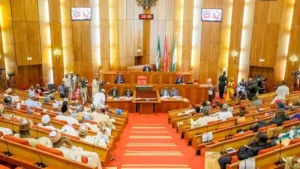Prince Lateef O. Fagbemi (SAN), the Minister of Justice and Attorney General of the Federation, has urged the National Assembly to avoid imposing a national anthem on Nigerians without broad consensus. Fagbemi emphasized that any change to the national anthem should genuinely reflect the majority’s wishes rather than being decided solely by legislative or presidential decree.

Speaking on Monday during a public hearing about a bill proposing the return of Nigeria’s original national anthem from October 1, 1960, Fagbemi highlighted the importance of citizen participation in such decisions. This discussion follows the House of Representatives and the Senate’s fast-tracked passage of the bill, which faced criticism from civil society organizations, academics, and the public.
Fagbemi argued that the process of changing the national anthem should involve comprehensive public engagement. He suggested holding zonal public hearings and seeking resolutions from the Federal Executive Council, Council of State, and both National and State Assemblies. According to Fagbemi, a national anthem should resonate universally with the citizens, fostering respect, patriotism, and national consciousness. He noted that in some countries, national anthems are chosen through open competitions or referendums to ensure they reflect the people’s collective aspirations and current socio-political conditions.
He stressed that the choice of a national anthem is too significant to be made solely by legislative action or presidential proclamation. Instead, Nigeria should learn from other countries’ processes in selecting national symbols. Many African nations adopted their own anthems, written by their citizens, as a break from colonial ties, symbolizing their newfound independence.
In contrast, Chief Dan Nwanyanwu, National Chairman of the Zenith Labour Party (ZLP), called for support of the National Assembly’s decision to revert to Nigeria’s original national anthem. During a media briefing in Abuja, Nwanyanwu argued that the original anthem inspires greater patriotism than the current one, which was introduced during military rule. He urged President Bola Ahmed Tinubu to promptly sign the bill into law for national unity and development.
Nwanyanwu pointed out that many countries retain their national anthems for centuries, whereas Nigeria often changes its symbols without clear justification. He believes the 1960 anthem, which addresses the nation’s diversity and religious complexities, evokes a strong emotional connection and promotes a vision of a united Nigeria where justice and equality prevail, with no group dominating others.




